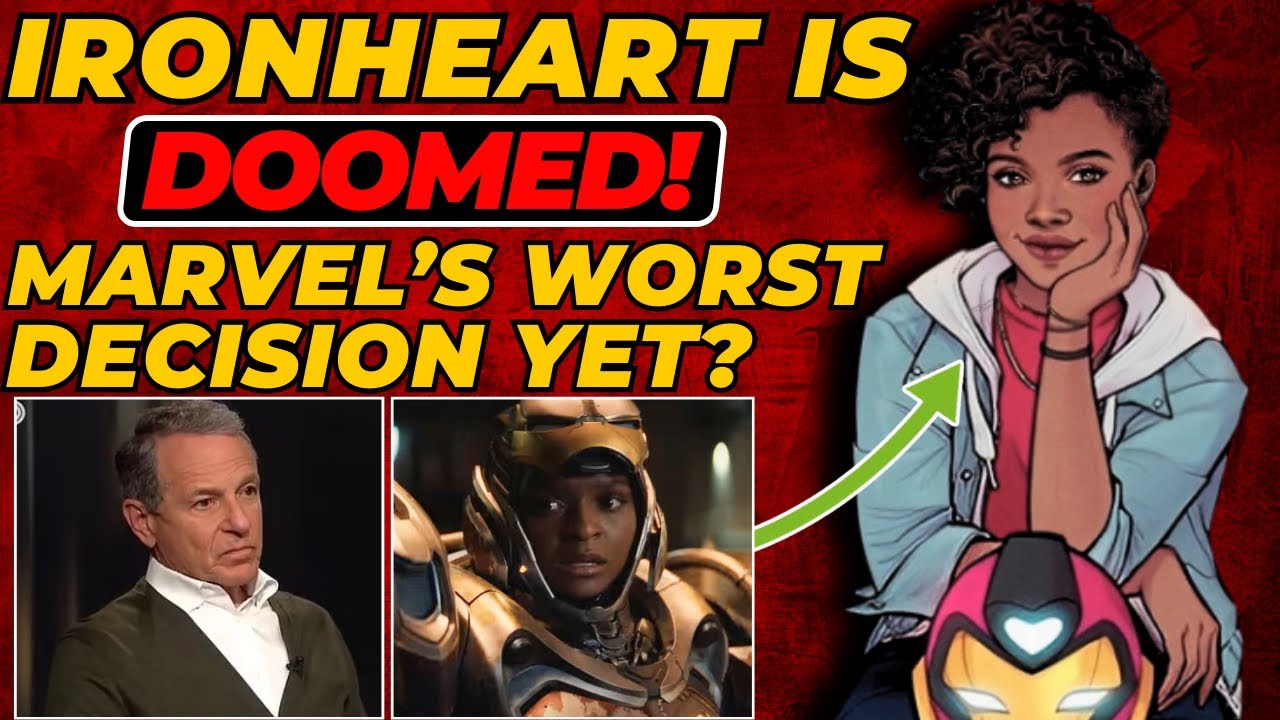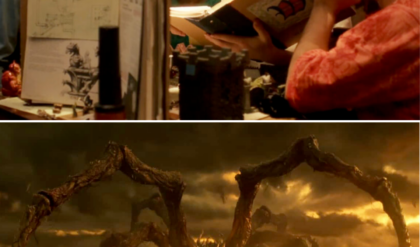The Marvel Cinematic Universe (MCU) has long been a cultural titan, but its Phase Five has faced turbulent waters, with fan discontent reaching new heights over Ironheart, the upcoming Disney+ series starring Dominique Thorne as Riri Williams. When Marvel dropped the first trailer for Ironheart on May 13, 2025, expectations were high for the young inventor introduced in Black Panther: Wakanda Forever (2022). Instead, the trailer ignited a firestorm, amassing over 265,000 dislikes on YouTube—64% of its total reactions—making it one of the most negatively received MCU trailers, trailing only The Marvels and She-Hulk: Attorney at Law. Amid this backlash, rumors swirled that Thorne had “attacked” fans, with social media posts claiming she dismissed critics as “haters” or worse. This article delves into the Ironheart trailer’s flop, the alleged comments from Thorne, the roots of fan frustration, and what this controversy means for Marvel’s future as it navigates a divided fanbase and a pivotal moment in its legacy.

The Trailer Flop: Why Fans Turned on Ironheart
Ironheart, set to premiere on Disney+ on June 24, 2025, with a three-episode launch, follows Riri Williams, a teenage MIT prodigy who returns to Chicago after her Wakandan adventure. The series, created by Chinaka Hodge and executive produced by Ryan Coogler, pits Riri’s technological genius against the magical powers of Parker Robbins, aka The Hood (Anthony Ramos), in a story blending street-level stakes with supernatural flair. The trailer showcased Riri suiting up in her vibranium-powered armor, stopping a runaway truck, and navigating Chicago’s Humboldt Park, with supporting cast members like Lyric Ross, Alden Ehrenreich, and Jim Rash adding depth. On paper, it promised a fresh take on the MCU’s tech-hero legacy, distinct from Tony Stark’s Iron Man.
Yet, the trailer failed to resonate. Social media platforms, particularly X, buzzed with criticism, with fans calling it “uninspired” and “another Marvel misfire.” Several factors fueled this reaction. First, the trailer’s emphasis on Riri’s genius—repeated lines from other characters praising her intellect—felt heavy-handed to some, with one X user noting, “Every line is just someone telling her she’s a genius, but where’s the story?” Second, the series’ shift to Chicago and its focus on The Hood, a villain tied to Daredevil in comics but reimagined as a Chicago-based gangster, sparked accusations of “forced changes” to fit a “woke” narrative. Posts on X claimed Marvel altered The Hood’s origins to prioritize diversity, a sentiment echoed by vocal critics who see Ironheart as part of a broader trend of replacing legacy characters like Tony Stark with younger, diverse heroes.
The trailer’s dislike-bombing mirrors patterns seen with other female-led MCU projects. The Marvels and She-Hulk faced similar online campaigns, often driven by a vocal minority upset over progressive casting or themes. Ironheart’s trailer, released just over a month before its premiere, suffered from perceptions of rushed marketing, with some fans questioning Marvel’s confidence in the project. The delay from its original 2023 release, attributed to Disney CEO Bob Iger’s push to slow Marvel’s output, meant nearly three years had passed since Riri’s debut in Wakanda Forever, leaving audiences disconnected from her character. One X post summed it up: “Who’s been waiting for Riri? Nobody knows her.” The long gap, combined with Marvel’s recent box office struggles—Thunderbolts (rebranded The New Avengers) underperformed—set a tough stage for Ironheart.
Did Dominique Thorne Attack Fans?
Central to the controversy are claims that Dominique Thorne lashed out at fans, escalating the backlash. Social media posts, including one from a prominent X account on May 19, 2025, alleged Thorne called critics “haters” or dismissed their feedback as “toxic,” with some claiming she said fans “don’t respect me because I’m Black.” However, these claims lack verified evidence. No public statements from Thorne directly attacking fans have surfaced in interviews or on her social media. Instead, recent interviews show her focusing on Riri’s journey, emphasizing the character’s vulnerability post-Wakanda Forever and her lack of a mentor like Tony Stark. In a May 20, 2025, interview with SFX Magazine, Thorne described Riri as navigating “trauma” and “vulnerability” after her kidnapping by Talokan, highlighting her growth without external guidance.
The “attack” narrative likely stems from misinterpretations or exaggerations of Thorne’s comments. For instance, a May 22, 2025, article reported Thorne discussing Riri’s differences from Tony Stark, noting she lacks his resources and mentorship, which could have been misconstrued as a jab at fans expecting an Iron Man clone. Additionally, an X post from May 21, 2025, mentioned fans “crapping on Dominique Thorne,” suggesting she faced personal attacks, which may have prompted a defensive response that was amplified into an “attack.” Without concrete evidence, these claims appear to be fueled by the internet’s echo chamber, where heated fan reactions and clickbait headlines distort reality.
Thorne’s actual public stance has been measured. She’s expressed excitement for Ironheart, praising its Chicago setting and the dynamic with The Hood, described as a “mystical, magical entity.” Her comments focus on Riri’s human side—her family ties, ambition, and moral dilemmas—rather than engaging with critics. The absence of verified inflammatory remarks suggests the “attack” narrative may be a fabrication or overblown reaction to her defending her role or the series. This aligns with broader patterns where female and minority-led projects face disproportionate scrutiny, with stars like Brie Larson and Tatiana Maslany enduring similar online pile-ons.
The Roots of Fan Frustration
To understand the Ironheart backlash, we must examine the broader context of Marvel’s Phase Five and fan expectations. The MCU, once a box office juggernaut, has faced criticism for inconsistent quality post-Avengers: Endgame. Projects like Thor: Love and Thunder and Ant-Man and the Wasp: Quantumania divided audiences, while Thunderbolts’s soft opening in 2025—prompting its rebrand to The New Avengers—underscored Marvel’s struggles to recapture its peak. Fans on X have expressed “Marvel fatigue,” citing oversaturation and a perceived decline in storytelling. Ironheart, as a lesser-known character’s solo series, faces an uphill battle to prove its relevance in this climate.
Riri Williams, introduced as a supporting character in Wakanda Forever, didn’t have the screen time to establish a deep fanbase. Her role, while charismatic, was overshadowed by the film’s focus on Shuri and Namor, leaving some viewers unconvinced of her readiness for a solo series. The trailer’s failure to highlight a compelling hook—beyond Riri’s armor and The Hood’s vague menace—further alienated fans expecting a clear tie to the MCU’s larger narrative, like Loki or WandaVision. The series’ Chicago setting, while fresh, feels disconnected from the cosmic or multiversal stakes of recent MCU projects, leading to accusations of it being a “filler” show.
The backlash also reflects tensions over Marvel’s push for diversity. Riri, a young Black woman replacing the white, male Tony Stark, has drawn ire from a vocal subset of fans who view her as a “woke” imposition. Similar sentiments targeted Captain Marvel and Ms. Marvel, with X posts decrying Ironheart as “another diversity checkbox.” These reactions often blend legitimate critiques—pacing, writing—with bias against progressive casting, creating a toxic feedback loop. The trailer’s dislike-bombing, while not reflective of the series’ quality, signals this divide, with some fans preemptively dismissing Ironheart based on its lead and themes.
Marvel’s Response and the Road Ahead
Marvel’s handling of Ironheart has drawn scrutiny. The delayed release and late trailer drop—just six weeks before premiere—suggest a lack of confidence, echoing the mishandled rollout of Echo, which dropped all episodes at once to muted buzz. A promotional video featuring Daredevil stars Charlie Cox and Vincent D’Onofrio praising the trailer was meant to boost hype but backfired, with fans on X calling it “forced shilling.” Ryan Coogler’s involvement, while a draw, hasn’t quelled criticism, with some accusing him of “spinning BS” to cover Marvel’s missteps. The studio’s decision to release three episodes at once aims to hook viewers, but with only six episodes total, Ironheart risks burning through its story too quickly.
For Dominique Thorne, the controversy is a double-edged sword. Her performance in Wakanda Forever earned praise, and her upcoming roles in Marvel Zombies and potential appearances in Avengers: Doomsday signal Marvel’s faith in her. However, the online vitriol, including personal attacks noted on X, underscores the pressure she faces as a young Black actress leading a high-profile project. If Ironheart succeeds, it could cement Thorne as a rising star and Riri as a fan-favorite hero, especially for underrepresented audiences inspired by her STEM background. If it falters, it risks reinforcing narratives of Marvel’s decline.
What This Means for Marvel and Its Fans
The Ironheart backlash highlights a critical juncture for the MCU. Marvel must balance its commitment to diverse storytelling with the expectations of a fanbase nostalgic for the Infinity Saga’s cohesion. Ironheart’s potential—to explore a grounded, tech-versus-magic narrative with a compelling young lead—is undeniable, but its success hinges on execution and audience goodwill. The trailer’s flop doesn’t doom the series; She-Hulk overcame similar online hate to earn solid streaming numbers. Still, Marvel must address fan concerns—better marketing, clearer narrative ties—to rebuild trust.
The alleged “attack” by Thorne, likely a misinterpretation, reflects the dangers of social media amplification. Fans and creators are caught in a cycle where criticism escalates into personal attacks, and responses are weaponized. Ironheart’s true test will be its quality, not its trailer’s dislike count or unverified rumors. For now, the controversy serves as a cautionary tale: in a polarized online world, even a genius like Riri Williams can’t escape the internet’s wrath.
Conclusion
The Ironheart trailer’s disastrous reception and the rumored clash between Dominique Thorne and fans have thrust Marvel into another PR storm. While the trailer’s flaws and Marvel’s marketing missteps fueled fan discontent, claims of Thorne “attacking” critics appear exaggerated, rooted more in online speculation than fact. The backlash reflects deeper tensions—Marvel’s evolving identity, fan fatigue, and resistance to change—that will shape Ironheart’s fate. As Riri Williams takes flight on June 24, 2025, her journey could either silence the haters or amplify the noise. For now, the MCU’s latest chapter is a lightning rod for debate, proving that even iron hearts can crack under pressure.





